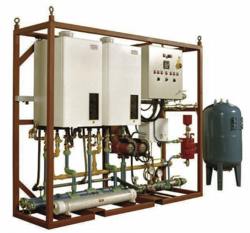The energy-efficiency opportunities for replacement boilers

Bringing boilers and associated equipment together in one package is a positive aid to replacement work — and minimises downtime.
A little extra effort goes a long way in enhancing energy efficiency when it is time to replace life-expired boiler plant — as we found out from KEN PERCIVAL and RICHARD WALKER.The boiler market in the UK is driven by replacement work. Ken Percival, director and general manager of Potterton Commercial, puts the proportion of replacement boilers at 70% of the total market. Such boilers in heating systems could typically be 20 years old — often much older. The temptation and, indeed, widespread practice is to attempt to install a new boiler of similar specification to the life-expired one. Not only does that approach lead to the benefits of modern boilers not being exploited, it is virtually inevitable that the heating system will be inefficient. Ken Percival explains, ‘Today’s boilers are very different from those they are being installed to replace. Legislation and technical developments have led to boilers becoming much more energy efficient and controllable. Even if a boiler is non-condensing, it will be much more efficient than what it is replacing, and modulating premix burners deliver greater efficiency at part load than at full load — whereas the old boiler is likely to be either on/off or high/low fire.’
Changes in building use His colleague Richard Walker, national sales and marketing director, focuses on the heating system being served. He urges that changes in the use of the building must be considered. Has, for example, the use of the building changed? Has a warehouse been converted into office accommodation. Has the fabric of the building been improved with the addition of thermal insulation and double glazing. Does the use of computers meet much of the heating requirement? ‘These are all reasons why accurate sizing of replacement boiler plant is very important, especially since boiler capacity is highly likely to have been oversized on the original installation.’ says Richard Walker. ‘It may well be,’ says Richard Walker, ‘that the boiler output could be reduced by 40%. The right thing to do is to size boilers properly for the application so that they can modulate properly. Modulation gives better load matching, and sophisticated controls can match output to building demand.’
Oversizing Ken Percival is also concerned about the prevalence of oversizing replacement boilers. He explains that all today’s boilers are tested to the requirements of the Boiler Efficiency Directive, but that the efficiency figures obtained are from bench tests. ‘That is not the same as seasonal efficiency,’ says Ken Percival. ‘Seasonal efficiency is the efficiency of the boiler in use, and the objective is to maximise that efficiency. Good control is important, using weather compensation, internal zoning and outside sensors.’ He also recommends that the flow and return temperatures should be set to suite the system, avoiding unnecessarily high return temperatures so as to achieve the differential for which the system is designed. ‘Some systems are designed for 20 K and some for 10 K,’ he points out.’ He also highlights the point that modern boilers generally have comprehensive controls built in, unlike boilers as young as 10 years old — which are unlikely to have much by way of on-board controls. And, of course, such major replacement work requires the whole system to be recommissioned. Unfortunately, the benefits of modern boilers may not be exploited if boiler plant fails and crisis action is required. ‘Such a situation can arise,’ says Ken Percival, ‘when local-authority funding is not available for boilers to be replaced during the school summer holidays and a distress purchase is necessary in the depths of winter. That is when nothing will be done to improve the system, such as upgrading controls.’
Part L Looking to the future, the new Part L (fuel conservation) of the Building Regulations is expected to have a significant effect on the boiler-replacement market. Ken Percival has been proactively involved in responding to the Government’s draft documents and consultation process. He explains, ‘With our own lobbying, along with support and effort via the ICOM Energy Association, we have been influential in the consultation with ODPM, DEFRA and their advisors Faber Maunsell, in bringing about important changes for the better in the proposed regulations. The replacement sector is a major proportion of the market place, and the new regulations will hopefully recognise the place for standard-efficiency products, as well as condensing. Of course, the matching of appropriate controls and systems will ensure that outputs are matched to the heat-load requirements of the building, thus optimising efficiency gains with new products. ‘We have made a significant contribution to the regulation’s second-tier guidance document, which is a major step forward in achieving a set of practical, working guidelines for the implementation of Part L. The regulations may tell you what to do, the guidelines will, importantly, tell you how to do it.’
Versatile In achieving energy-efficient systems, Ken Percival’s view is that condensing boilers are well suited to the new-build market but that they can also be used in replacement projects in some cases. His challenge to the industry is, ‘We as manufacturers, specifiers and installers must be versatile in the approach to specification — considering not only what is right for the application but also what is the most cost-effective and energy-efficient solution for every application.’
Potterton Commercial is at Brooks House, Coventry Road, Warwick CV34 4LL.
Related links:


